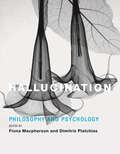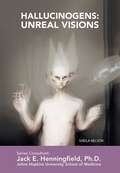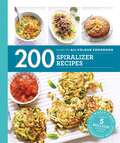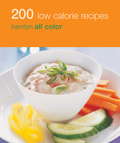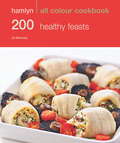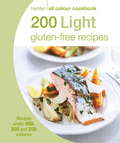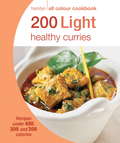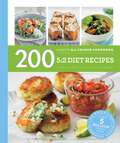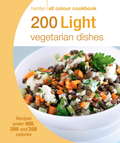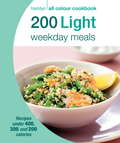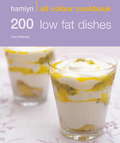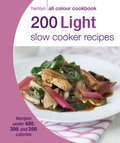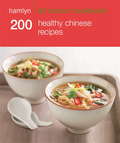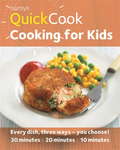- Table View
- List View
Hallucination: Philosophy and Psychology
by Fiona Macpherson Dimitris PlatchiasScientific and philosophical perspectives on hallucination: essays that draw on empirical evidence from psychology, neuroscience, and cutting-edge philosophical theory.Reflection on the nature of hallucination has relevance for many traditional philosophical debates concerning the nature of the mind, perception, and our knowledge of the world. In recent years, neuroimaging techniques and scientific findings on the nature of hallucination, combined with interest in new philosophical theories of perception such as disjunctivism, have brought the topic of hallucination once more to the forefront of philosophical thinking. Scientific evidence from psychology, neuroscience, and psychiatry sheds light on the functional role and physiology of actual hallucinations; some disjunctivist theories offer a radically new and different philosophical conception of hallucination. This volume offers interdisciplinary perspectives on the nature of hallucination, offering essays by both scientists and philosophers.Contributors first consider topics from psychology and neuroscience, including neurobiological mechanisms of hallucination and the nature and phenomenology of auditory-verbal hallucinations. Philosophical discussions follow, with contributors first considering disjunctivism and then, more generally, the relation between hallucination and the nature of experience. ContributorsIstván Aranyosi, Richard P. Bentall, Paul Coates, Fabian Dorsch, Katalin Farkas, Charles Fernyhough, Dominic H. ffytche, Benj Hellie, Matthew Kennedy, Fiona Macpherson, Ksenija Maravic da Silva, Peter Naish, Simon McCarthy-Jones, Matthew Nudds, Costas Pagondiotis, Ian Phillips, Dimitris Platchias, Howard Robinson, Susanna Schellenberg, Filippo Varese
Hallucinogens: Unreal Visions (Illicit and Misused Drugs)
by Sheila NelsonSeeing things that aren't really there, thinking thoughts you would never normally have thought-- hallucinogenic drugs work on the body by altering the way a person thinks, feels, or experiences reality. Some of these drugs are found in nature, while others are created in laboratories. All of them can have dangerous short-term and long-term effects. Hallucinogens: Unreal Visions tells the long history of these drugs. Because of the effects hallucinogens have on perceptions, people have often believed these drugs were showing them deeper meanings about the world or helping them connect with gods or their own unconscious minds. Hallucinogens, however, can be extremely dangerous. While legitimate medical or therapeutic uses may be found for these drugs in the future, taking them with friends or alone could be extremely dangerous or even deadly. This book will tell you more.
Hamlyn All Colour Cookery: 200 Low Calorie Recipes
by HamlynFor those of us wishing to follow a balanced and low-fat diet, it can be difficult to keep mealtimes interesting without reaching for those tempting calorie-laden ingredients. However, Hamlyn All Colour: 200 Low Calorie Recipes is here to help - providing 200 simple and delicious recipes that take the hassle out of producing great, healthy food. There are also plenty of ideas for guilt-free sweet indulgences! From Chicken Burgers with Tomato Salsa and Crab & Coriander Cakes to Passion Cake Squares and White Chocolate Drops, there's a low calorie recipe for every occasion, complete with step-by-step instructions and a full-page colour photograph to ensure perfect results for every chef, every time.
Hamlyn All Colour Cookery: 200 Spiralizer Recipes
by Denise SmartEnjoy an array of vegetables at the turn of a handle - in minutes the spiralizer creates spaghetti, ribbons and spirals from your favourite vegetables. From courgetti (courgette spaghetti) to cunoodles (cucumber noodles), it is now easier than ever to create healthy twists to your favourite meals. Featuring delicious recipes such as Butternut squash, goats cheese & sage tart, Thai beef salad and Pear tart tatin, 200 Spiralizer Recipes is perfect for the health-conscious; these fruits and vegetables can become the star of your dish, replacing heavier ingredients such as pasta and rice, so that you can enjoy your meal while eating fewer calories and cutting back on refined carbohydrates.
Hamlyn All Colour Cookery: 200 Spiralizer Recipes (Hamlyn All Colour Cookery)
by Denise SmartEnjoy an array of vegetables at the turn of a handle - in minutes the spiralizer creates spaghetti, ribbons and spirals from your favourite vegetables. From courgetti (courgette spaghetti) to cunoodles (cucumber noodles), it is now easier than ever to create healthy twists to your favourite meals. Featuring delicious recipes such as Butternut squash, goats cheese & sage tart, Thai beef salad and Pear tart tatin, 200 Spiralizer Recipes is perfect for the health-conscious; these fruits and vegetables can become the star of your dish, replacing heavier ingredients such as pasta and rice, so that you can enjoy your meal while eating fewer calories and cutting back on refined carbohydrates.
Hamlyn All Colour Cookery: Hamlyn All Color Cookbook
by HamlynFor those of us wishing to follow a balanced and low-fat diet, it can be difficult to keep mealtimes interesting without reaching for those tempting calorie-laden ingredients. However, Hamlyn All Color: 200 Low Calorie Recipes is here to help - providing 200 simple and delicious recipes that take the hassle out of producing great, healthy food. There are also plenty of ideas for guilt-free sweet indulgences! From Chicken Burgers with Tomato Salsa and Crab & Coriander Cakes to Passion Cake Squares and White Chocolate Drops, there's a low calorie recipe for every occasion, complete with step-by-step instructions and a full-page color photograph to ensure perfect results for every chef, every time.
Hamlyn All Colour Cookery: Hamlyn All Color Cookbook
by Louise BlairGluten-free is the way to be for many of those who suffer from coeliac disease, gluten allergies and even those who simply want to cut wheat from their diet. With over 200 delicious recipes, Hamlyn All Color: 200 Gluten-Free Recipes showcases how easy life can be when eating gluten-free, and beautiful photographs and clear instructions make this book perfect for every cook at all ability levels. With recipes such as breakfast cereal bars, Thai coconut chicken, Victoria sandwich cake, chocolate caramel shortbread and lemon drizzle cake, this book enables home cooks to create healthy meals at home without sacrificing flavor.
Hamlyn All Colour Cookery: Hamlyn All Color Cookbook (Hamlyn All Colour Cookery)
by HamlynFor those of us wishing to follow a balanced and low-fat diet, it can be difficult to keep mealtimes interesting without reaching for those tempting calorie-laden ingredients. However, Hamlyn All Color: 200 Low Calorie Recipes is here to help - providing 200 simple and delicious recipes that take the hassle out of producing great, healthy food. There are also plenty of ideas for guilt-free sweet indulgences! From Chicken Burgers with Tomato Salsa and Crab & Coriander Cakes to Passion Cake Squares and White Chocolate Drops, there's a low calorie recipe for every occasion, complete with step-by-step instructions and a full-page color photograph to ensure perfect results for every chef, every time.
Hamlyn All Colour Cookery: Hamlyn All Color Cookbook (Hamlyn All Colour Cookery)
by Louise BlairGluten-free is the way to be for many of those who suffer from coeliac disease, gluten allergies and even those who simply want to cut wheat from their diet. With over 200 delicious recipes, Hamlyn All Color: 200 Gluten-Free Recipes showcases how easy life can be when eating gluten-free, and beautiful photographs and clear instructions make this book perfect for every cook at all ability levels. With recipes such as breakfast cereal bars, Thai coconut chicken, Victoria sandwich cake, chocolate caramel shortbread and lemon drizzle cake, this book enables home cooks to create healthy meals at home without sacrificing flavor.
Hamlyn All Colour Cookery: Hamlyn All Colour Cookbook
by Jo McAuleyHamlyn All Colour Cookbook 200 Healthy Feasts will show you that 'healthy' doesn't have to mean 'boring'. If your aim is to eat healthily, but dread feeling hungry and lacking in energy, then Healthy Feasts will show you how easy it is by offering a variety of delicious, substantial and nutritious recipes designed to satisfy even the biggest appetites and keep you going until the next meal. With a focus on getting your '5-a-day' and eating meals rich in fish, fibre and maintaining a GI balance, Healhty Feasts provides for wholesome meals without the restraints of a traditional diet. The great flavours, appearance and aromas from these recipes will appeal to all your senses and by following the recipes in this book, you will find it easier and more enjoyable to eat a healthy, well-balanced diet without the feeling that you are being denied all the 'good stuff'.
Hamlyn All Colour Cookery: Hamlyn All Colour Cookbook (Hamlyn All Colour Cookery)
by Angela DowdenMillions of people either suffer from gluten intolerance or choose to reduce their intake of gluten as part of a healthy lifestyle. With stunning photographs and clear step-by-step instructions, Hamlyn All Colour Cookbook: 200 Light Gluten-Free Recipes offers a range of tasty, low-calorie dishes that are free from gluten and simple to make.
Hamlyn All Colour Cookery: Hamlyn All Colour Cookbook (Hamlyn All Colour Cookery)
by Angela DowdenDelicious and aromatic as they are, many curries contain a lot of oil, butter and cream - bad news for dieters and the health conscious.The recipes in this book will show you how to coook delicious healthy curries without compromising on flavour or taste, by substituting healthy options, such as groundnut oil and low-fat natural yoghurt in place of full-fat alternatives.There is nothing more satisfying than producing a rich, aromatic curry to share with family and friends - whether it be Indian, Southeast Asian or even Japanese, with these low-calorie options, you can try a new delicious curry recipe every night.
Hamlyn All Colour Cookery: Hamlyn All Colour Cookbook (Hamlyn All Colour Cookery)
by Angela DowdenWhether you're new to the 5:2 diet and you're thinking about giving it a go, or you're already a convert and are looking for recipes to improve your fasting days, this is the book for you.Choose from a delicious range of satisfying light meals from a variety of world cuisines, all organised by mealtime so that you can quickly select a recipe.Get your fasting day off to a good start with a breakfast of fragrant Moroccan baked eggs or chunky Maple-glazed granola.Opt for a light lunch of Chicken burgers with tomato salsa, Chilli & coriander fish parcels or Smoky bacon & white bean soup to see you through the afternoon.End the day with a serving of Lamb & flageolet bean stew, Chicken & spinach curry or a special meal of Lobster with shallots & vermouth.You can even include sweet treats without breaking your diet - this selection includes Brulee vanilla cheesecake, Chocolate & chestnut roulade and Cherry & nectarine pavlova.Make the 5:2 diet a life choice with this indispensable recipe collection.Check out some of the other titles in the series:200 Cakes & Bakes (ISBN 978-0-600-63329-7)200 Family Slow Cooker Recipes (ISBN 978-0-600-63057-9)200 Halogen Oven Recipes (ISBN 978-0-600-63344-0)200 One Pot Meals (ISBN 978-0-600-63339-6)200 Pasta Dishes (ISBN 978-0-600-63334-1)200 Super Soups (ISBN 978-0-600-63343-3)200 Veggie Feasts (ISBN 978-0-600-63337-2)
Hamlyn All Colour Cookery: Hamlyn All Colour Cookbook (Hamlyn All Colour Cookery)
by Angela DowdenChicken is the most widely-consumed meat on the planet. It is inexpensive, quick to cook and hugely versatile, and its mild flavour makes it a favourite with people of every age, making it a great choice for a family meal.Chicken is a great choice for dieters because it contains a lot of protein and very little fat - steamed or grilled chicken breast is one of the leanest and healthiest meats available. Not only that, but its mild flavour means it can be adapated to an infinite number of different ingredients, from the delicate tastes of Mediterranean foods, such as basil and olives, right through to the rich and heady spicy stews and curries of India. Think of chicken as a deliciously light and low-fat blank canvas to which you can add all your favourite flavours, and be inspired by the global influences of this recipe collection.
Hamlyn All Colour Cookery: Hamlyn All Colour Cookbook (Hamlyn All Colour Cookery)
by Angela DowdenDieting doesn't have to mean giving up the things you love, thanks to the Hamlyn All Colour: Light series. When you fancy a fruity or chocolatey treat or are entertaining friends, look no further than our collection of treats, which all clock in at under 300, 400 or 500 calories. From comforting puddings for a cold winter's night to lighter treats for summer evenings, and from the luscious taste of chocolate to the tang of seasonal fruit, we show you that by using healthier ingredients and cooking methods, you can still savour the taste of a delicious dessert.
Hamlyn All Colour Cookery: Hamlyn All Colour Cookbook (Hamlyn All Colour Cookery)
by Angela DowdenCutting down on red meat is a great way to avoid eating too much saturated fat, as well as keeping your cholesterol low. Now that the quality of fruit and vegetables that we can buy is so good, more and more people are opting to eat meat-free meals in order to save money and calories. This book can help you start up a meat-free regime, or if you are a already a committed vegetarian, it can boost your repertoire with its inventive low-fat meals that come in under either 500, 400 or 300 calories. A delicious range of salads, soups, main courses and desserts for low-calorie meat-free meals at any time of day.
Hamlyn All Colour Cookery: Hamlyn All Colour Cookbook (Hamlyn All Colour Cookery)
by Angela DowdenFor many, cooking in the week is a bore; it's a 'must-do' rather than a 'want to' activity in their busy schedule, and when energy levels are low, it's all too easy to reach for a take away menu and break the diet. However, thanks to this simple recipe collection, cooking can be a creative, therapeutic and above all, a brief process! These recipes will kick-start your enthusiasm and tantalise your tastebuds, and to top it all off, they're all between just 300 and 500 calories!
Hamlyn All Colour Cookery: Hamlyn All Colour Cookbook (Hamlyn All Colour Cookery)
by Cara HobdayEveryone likes to eat healthily and eat well, but sometimes it's difficult to combine the two without your diet becoming repetitive. However, help is at hand in the form of Hamlyn All Colour Cookbook: 200 Low Fat Recipes, a cookbook crammed with low-fat recipes. Choose from 200 simple, healthy, tasty meals including Thai-style Haddock Parcels with Coconut Rice, Chargrilled Lamb with Hummus & Tortillas, Monkfish Brochettes with Cannellini Beans & Pesto and Spicy Goan Aubergine Curry. And once you've enjoyed your main course, treat yourself to a wide selection of low-fat desserts such as the Mango & Passion Fruit Trifle or Chocolate & Nectarine Soufflé Cake.Every recipe is accompanied by a full-page colour photograph and clever variations and ideas so that you have over 200 meals to choose from, meaning you and your family can stay healthy and happy without going hungry!
Hamlyn All Colour Cookery: Hamlyn All Colour Cookbook (Hamlyn All Colour Cookery)
by HamlynFor those of us wishing to follow a balanced and low-fat diet, it can be difficult to keep mealtimes interesting without reaching for those tempting calorie-laden ingredients. However, Hamlyn All Colour: 200 Low Calorie Recipes is here to help - providing 200 simple and delicious recipes that take the hassle out of producing great, healthy food. There are also plenty of ideas for guilt-free sweet indulgences! From Chicken Burgers with Tomato Salsa and Crab & Coriander Cakes to Passion Cake Squares and White Chocolate Drops, there's a low calorie recipe for every occasion, complete with step-by-step instructions and a full-page colour photograph to ensure perfect results for every chef, every time.
Hamlyn All Colour Cookery: Hamlyn All Colour Cookbook (Hamlyn All Colour Cookery)
by Jo McAuleyHamlyn All Colour Cookbook 200 Healthy Feasts will show you that 'healthy' doesn't have to mean 'boring'. If your aim is to eat healthily, but dread feeling hungry and lacking in energy, then Healthy Feasts will show you how easy it is by offering a variety of delicious, substantial and nutritious recipes designed to satisfy even the biggest appetites and keep you going until the next meal. With a focus on getting your '5-a-day' and eating meals rich in fish, fibre and maintaining a GI balance, Healhty Feasts provides for wholesome meals without the restraints of a traditional diet. The great flavours, appearance and aromas from these recipes will appeal to all your senses and by following the recipes in this book, you will find it easier and more enjoyable to eat a healthy, well-balanced diet without the feeling that you are being denied all the 'good stuff'.
Hamlyn All Colour Cookery: Hamlyn All Colour Cookbook (Hamlyn All Colour Cookery)
by Joy SkipperFeaturing stunning photographs and clear step-by step instructions, Hamlyn All Colour Cookbook: 200 Light Sugar-free Recipes is a great choice if you want to lower your sugar intake yet still enjoy the sweeter things in life. Recipes range from Scallops wrapped in Parma ham, Potato pizza margerita and Roast pork loin with creamy cabbage & leeks to Poppy seed & lemon cupcakes, Banana & buttermilk pancakes and Rosemary panna cottas - and each one is under 500 calories.
Hamlyn All Colour Cookery: Hamlyn All Colour Cookbook (Hamlyn All Colour Cookery)
by Joy SkipperRid your body of toxins and lose weight in the process with this latest addition to the Hamlyn All Colour series. 200 Juice Diet Recipes provides a selection of juice recipes to help you slim down or simply cleanse your system.
Hamlyn All Colour Cookery: Hamlyn All Colour Cookbook (Hamlyn All Colour Cookery)
by Sara LewisIn this book you'll find low-calorie recipes to suit all occasions. Warming soups, stews and casseroles that can cook slowly all day and be ready when you come in from work are perfect for dieters as they are a secret weapon against evening binging on fast food when you're too tired to cook. You'll be surprised at the selection of fresh-tasting lighter meals that really lend themselves to slow cooking. Let your slow cooker make your dieting effortless!
Hamlyn All Colour Cookery: Hamlyn All Colour Cookbook (Hamlyn All Colour Cookery)
by Sunil VijayakarDitch the takeaways and learn to make your very own fresh and healthy Chinese food. Learn to make all your favourites dishes, with recipes including Chicken noodle soup, Sweet and sour pork and Singapore chicken, and let your tastebuds be tempted by more unusual textures and flavours, as you choose from an exciting array of dishes, from Duck with honey and lime sauce to Peanut, squid and noodle salad, to Sesame tuna with spicy noodles. With a wide range of dishes including broths, main courses, salads and snacks, you can enjoy Chinese cuisine at any time of day, in your own home.
Hamlyn QuickCook: Cooking for Kids
by Emma Jane FrostEliminate tea-time tantrums for good with this fantastic collection of recipes designed to appeal to children while giving you the piece of mind that they are eating a healthy balanced diet. From BakedWholemeal Breakfast Muffins with Bacon and Cheese, to Sticky Chicken Drumsticks with Homemade Coleslaw and falafel with Crudités, you'll give your kids a great start to the day as well as fantastic lunch box treats.In addition there are recipes that will suit the whole family for dinner such as Smokey Sausage and Bean Casserole with Peppers and Creamy Pork and Apple Pies as well as traditional and brand-new kids' favourites including Fish Fingers with Sweet Potato Chips and Bacon, Pea and Potato Frittata. As always with the Quickcook series every recipe offers 10-, 20- and 30-minute options to suit your busy schedule.Breakfast and Lunchbox - including Spiced Eggy Fruit Bread with Yogurt and Berries, On-the-go Granola Breakfast Bars, Sausage and Tomato Puff Pastry Turnover and Lightly Curried Cous Cous Salad.Kids' Favourites - including Easy Scone Pizzas, Homemade Chicken Nuggets with Sunblush Tomato Dipping Sauce, Shepherd's Pie with Hidden Veg and Frankfurter Frittata.For All the Family - including Kedgeree-style rice with Spinach, Gnocchi Pasta Gratin, One-Pot Paella and Chicken, Bacon and Leek Pies.Tasty Treats - including Chocolate Pots with hidden Prunes, Strawberry & Raspberry Eton Mess, Orange Drizzle Tray Bake and Puff Pastry Apple & Cinnamon Tarts.
